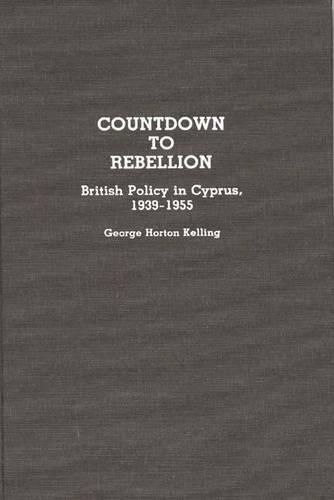
Countdown to Rebellion: British Policy in Cyprus, 1939-1955
(Hardback)
Publishing Details
Countdown to Rebellion: British Policy in Cyprus, 1939-1955
By (Author) George Kelling
Bloomsbury Publishing PLC
Praeger Publishers Inc
18th May 1990
United States
Classifications
Tertiary Education
Non Fiction
Colonialism and imperialism
National liberation and independence
956.4503
Physical Properties
Hardback
200
Width 156mm, Height 235mm
510g
Description
This work examines British rule in Cyprus, with a focus on how Britain formulated policies for that rule. It traces Britain's imperial and foreign policy in Cyprus from 1939 to 1955, from the outbreak of World War 2 until the beginning of the EOKA rising of 1955. The book puts forward two basic arguments. First, the violence of 1955 was not a thunderbolt from the blue, but the logical outcome of the events of the previous year. Second, British policy was an often ill-defined set of ideas devised between British ministries and departments in conflict over the form the island's future should take. This study examines a number of actions by colonial administrators which, with the advantage of hindsight, appear out of step with reality. Following the introduction, which opens with a discussion of the history and geography of Cyprus in 1939, the book covers the outbreak of the war and the invasion threat. After its coverage of the war years, the book details the developments in Cyprus during the years 1945-1949, a period which saw the British offer the constitution to the Cypriots. Next, the book discusses the Plebiscite, Turkish reactions to changes in Cyprus, and other events that occurred in Cyprus between 1949-1951. The next section details the rise of Makarios (1951-1953), and finally, the book concludes with a discussion of the role of the United Nations and the rise of violence beginning in 1955. This book should interest researchers and students of Cypriot and British history, the Cold War, the United Nations, and the course of Anglo-Greek relations.
Reviews
Most recent books on Cyprus tend to deal with the subject from either the Greek/Greek-Cypriot perspective or from that of the Turks; moreover most studies tend to concentrate on the period after the island's independence in 1960, with only a cursory glance at the background. Kelling makes up this shortcoming by analyzing British policy toward Cyprus from the early 1930s to the Greek-Cypriot rebellion of 1955. The reader is able to follow the development of nationalism on the island first among the Greeks and then among the Turkish minority. What emerges clearly from Kelling's discussion is how the British used the Turkish card, as they called it, to thwart Greek aspiration for enosis or Cyprus's union with Greece. But this book is broader than the title suggests; Kelling examines British attitudes (or minds) toward the colony, attitudes that are equally applicable to other colonial situations. Britain's Cyprus policy is placed in the context of a declining empire determined to remain a world power, especially after the loss of India, Palestine, and Egypt. Thus Kelling's monograph may be read with pleasure and profit not only by those interested in the history and politics of Cyprus but by anyone interested in the process of decolonization. * Choice *
Author Bio
George Horton Kelling, PhD, is a historian with the United States Air Force. He spent twenty years as a soldier.
